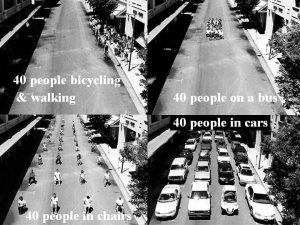It is quite common for advocates of transit to argue that such improvements will reduce traffic congestion.
But advocates must be very careful when stating this.
While I am confident that quality transit coupled with effective transit incentives will take car trips off of roads, I am not at all sure that even the best transit can noticeably reduce congestion (a congestion reduction that is so substantial that motorists are easily able to see congested conditions become free-flowing conditions).
Motor vehicles consume such an immense amount of space, per traveler, that even a tiny number of motorists can quickly fill a road to congestion (see image photo  series). Therefore, it seems to me that if a city does NOT have congestion, there must be something terribly wrong with the city, since it only takes about 40 motorists to gridlock a street – not a lot of people.
series). Therefore, it seems to me that if a city does NOT have congestion, there must be something terribly wrong with the city, since it only takes about 40 motorists to gridlock a street – not a lot of people.
Even if large percentages were using transit/carpools/bicycles, etc., and only a small percent are single-occupant vehicles (SOVs), it only takes a small number of SOVs to create congestion.
Even if it were true that transit could noticeably reduce congestion, induced demand and the triple convergence would quickly fill up the newly free-flowing roads. The triple convergence informs us that in any reasonably healthy community, roadway space that is freed up will quickly be filled again because the newly-available road space induces new car trips that would not have occurred had the road not been made free-flowing. Those new trips come from motorists converging on the new road space who were formerly driving at non-rush hour times, using alternative routes, or traveling by bicycle, walking or transit.
I therefore believe that it is strategically problematic to claim in a debate with those who oppose improvements for transit (and who instead want to spend money to make motor vehicle travel easier) that transit reduces congestion. The motor vehicle advocates are placed in a strong debate position when the argument is framed in such a way as to suggest transit reduces congestion, because almost no one is able to point to a single community where transit has noticeably reduced congestion, even where there is good transit. Are the great cities of the world – Rome, Paris, DC, NYC – free of congestion because they have quality transit? I think most everyone perceives each of those wonderful cities to be grid-locked.
Therefore, argues the motor vehicle advocate, transit is wastefully ineffective.
I think we are in a much better debate position when we don’t get caught up in that sort of debate framing. Instead, the point I try to make is not that transit will significantly reduce congestion, but that it will provide choices. One can choose to get stuck in traffic by stubbornly continuing to drive a car. Or one can decide they are unwilling to tolerate the congestion, and instead choose to use transit (or better yet, live closer to their destination). Or avoid rush hour. Or take an alternative route.
Are there effective tactic for reducing congestion? Yes. I am supportive of congestion-pricing and proper parking management as an effective, if politically unrealistic, strategies to reduce congestion.
The key, in my opinion, for a healthy community is not to fight against congestion. Fighting against congestion too often leads even the most progressive communities to not only set up ineffective, “empty bus syndrome,” transit systems – which gives transit a black eye, but also encourages the default solution: road widening. While I don’t tend to say this publicly, I am passively supportive of congestion because it delivers compact, higher density development, more transit use, and less severe crashes, among other community benefits.
In sum, my vision for a healthy community is not to strive to reduce congestion (which may not be possible at the local level, anyway, and can easily be counter-productive), but to ensure that there are transportation and lifestyle choices so that one can choose to opt out of what is probably intractable congestion. I believe it is a mistake, tactically, to suggest that transit will reduce congestion.


